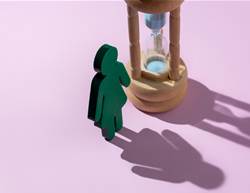Maybe you’ve just experienced your first hot flush, or perhaps you’ve been experiencing symptoms for a while now. Either way, you’re probably hoping that you won’t have to experience the effects of menopause much longer. Although every woman’s experience is unique, we tapped women’s health experts to ask, “How long does menopause last?!” and how to find relief in the meantime.
Menopause is defined as the permanent cessation of menstruation, which typically occurs around the age of 50, although it can occur earlier or later, explains ob/gyn and menopause expert Dr Anat Sapan. “Menopause occurs as a decline in the production of the hormones oestrogen, progesterone and testosterone,” and as a result, you can experience a variety of symptoms for various lengths of time.
So, here’s everything you need to know about menopause symptoms, how long those symptoms will last, and how to manage them.
How long do menopause symptoms typically last?
The length of symptoms (or if you have them at all) are different for each woman, says Dr Beth Oller. “The menopausal transition usually begins between ages 45-55.”
Most women have the most bothersome symptoms during perimenopause, the years before you technically enter menopause, says Dr Oller. This period can start up to 10 years before you officially enter menopause. “During this time, your body begins to make less oestrogen and progesterone, and levels of these two hormones both made by the ovaries can vary greatly, thus accounting for different severity and length of symptoms,” she explains.
The first sign that someone is entering the menopausal transition is a change in their menstrual cycles, and this can be cycles either becoming closer together or further apart, and bleeding can be lighter or heavier, notes Dr Oller.
The duration of menopausal symptoms can vary widely from woman to woman, says ob/gyn Dr Sarah de la Torre. “In general, symptoms can last anywhere from a few months to several years.”
The length of time that symptoms persist can depend on a variety of factors, including the individual woman’s hormonal levels, age at menopause, and overall health, explains Dr De la Torre. “For some women, symptoms may only last for a short period of time, while others may experience symptoms for several years or longer.”
Menopause symptoms
Menopause should be thought of as three stages: perimenopause, menopause, and postmenopause, explains Dr Oller. Symptoms that most people associate with menopause usually begin during perimenopause, and the average amount of time for perimenopausal symptoms is four years.
Someone is considered to have reached menopause when they haven’t had a period for 12 consecutive months, then postmenopause begins, notes Dr Oller. “Symptoms generally improve in the menopause and postmenopause stages.”
The typical symptoms of menopause can vary from woman to woman. According to Dr De la Torre, these can include the following:
Hot flushes and night sweats: These are common symptoms of menopause and can last for several months to several years. The frequency and severity of hot flashes and night sweats can also vary widely.
Irregular periods: As women approach menopause, their menstrual cycles may become irregular before eventually stopping. This can last for several months to a few years.
Vaginal dryness and discomfort: Reduced oestrogen levels during menopause can cause vaginal dryness and discomfort during intercourse. This can last for several months to several years.
Trouble sleeping: Insomnia and other sleep disturbances can be common symptoms of menopause and can last for several months to several years. This can be due to other symptoms, such as hot flashes or mood changes, but it can also be due to sleep apnoea. Studies have shown that postmenopausal women are two to three times more likely to have sleep apnoea compared with premenopausal women.
Mood changes: Fluctuating oestrogen and progesterone levels, plus other factors, cause serotonin production disruption, leading to more mood swings, per the Endocrine Society. Mood swings, irritability and depression are common during menopause and can last for several months to several years.
Fatigue: Fluctuating oestrogen and progesterone levels can also lead to fatigue. Many women experience fatigue and decreased energy during menopause, which can last for several months to several years.
Urinary problems: Reduced oestrogen levels can weaken the bladder and the urethra, compromising their ability to control urinary functions. Reduced oestrogen also alters the acidity of the vulva and the vagina, which can make the area more prone to infection by bacteria or yeast overgrowth. This is why menopause can increase the risk of urinary incontinence and urinary tract infections. These symptoms can last for several months to several years.
In addition to the symptoms listed above, Dr Oller adds that you may also experience dry skin and eyes, headaches, hair loss or thinning, weight gain, change in focus and memory and joint pain.
There are also silent symptoms that should not be ignored, such as gradual loss of bone density, cognitive decline, increased risk of cardiovascular disease, and changes in vaginal health and decreased libido, notes Dr Sapan. “It’s important to note that these silent symptoms of menopause may not be immediately noticeable, but can have a significant impact on a woman’s overall health and quality of life.”
How can you manage menopause symptoms?
The good news is solutions now exist to treat menopause symptoms and women no longer have to suffer in silence, says Dr de la Torre.
Each woman has her own unique experience. However, there are several ways to manage symptoms, including:
Hormone replacement therapy: The most effective way to treat the symptoms of menopause is with hormone replacement therapy (HRT), says Dr Sapan. “This treatment involves replacing oestrogen, progesterone and testosterone that are lost during menopause with synthetic hormones.” HRT can help alleviate symptoms such as hot flushes, night sweats and vaginal dryness but also protect the brain, bones and heart.
Most doctors will prescribe the lowest amount of hormone for the shortest amount of time, because there are risks to taking hormones, says Dr Oller. Some of these risks include a higher risk of endometrial cancer (only when oestrogen is taken without progestin), breast cancer with long-term use, cardiovascular disease (including heart attack), and blood clots and stroke, according to Healthdirect. Still, Dr Oller believes “the benefits will likely outweigh the risks if someone’s life is being affected by frequent hot flushes.”
Lifestyle changes: Making healthy lifestyle changes can also help manage menopause symptoms. Eating a balanced diet, staying physically active, reducing stress and getting enough sleep can all help improve overall health and reduce the severity of symptoms, notes Dr Sapan.
Alternative therapies: Some women find relief from menopause symptoms through alternative therapies such as acupuncture, yoga, certain supplements and meditation, says Dr de la Torre.
Medications: Certain medications such as antidepressants, blood pressure medications, and others may also be prescribed to manage menopause symptoms, says Dr de la Torre. If someone is still having periods, a low dose birth control pill can help replenish low levels of oestrogen and relieve symptoms, notes Dr Oller.
Vaginal lubricants: Women experiencing vaginal dryness and discomfort during intercourse can use over-the-counter vaginal lubricants to alleviate symptoms, suggests Dr de la Torre. You can talk to your family physician about which ones they recommend, and also if these do not help, to discuss other options like topical oestrogen cream to help with symptoms, adds Dr Oller.
Home-use devices and products: For hot flushes, Dr Oller suggests having a fan at work or home, removing clothes when it feels like a hot flush is coming on, and seeing if you can identify any triggers that seem to bring your hot flushes on and avoid them. From skincare to vaginal care, find what works for you, says Dr de la Torre. “Focus on what concerns you the most and talk to your doctor to see what they can recommend specifically for you.”
Supplements: Supplements may help you fill in nutritional gaps, support your body’s natural processes and some may help ease menopausal symptoms, says dietitian Chloe Giraldi. However, supplements should be a complement to a healthy lifestyle, balanced diet, daily movement, stress management and sleep practices, not a substitute, she notes. “Focus on establishing healthy habits first and consider supplements the ‘icing on the cake’ once you have a solid foundation.”
It’s important to note that the duration of any menopause symptoms can vary widely from woman to woman and can also depend on the severity of symptoms and overall health, says Dr de la Torre. “If you are experiencing symptoms that are affecting your quality of life, it’s important to discuss your concerns with your healthcare provider.”
When should you see a doctor about menopause symptoms?
There’s no time like the present to start discussing your symptoms with your doctor to find out how best to manage them. You should see a doctor when you first start having symptoms of sleep disturbances or hot flashes, even if you are in the perimenopause phase, says Dr Sapan. “You don’t need to wait until your periods cease.”
Menopause can have a significant impact on a woman’s overall health, so regular check-ups and screenings are essential, adds Dr de la Torre. “Your doctor can help you manage any symptoms and provide guidance on maintaining your overall health and well-being during this transition.” She suggests looking for doctors who have specialised training on menopause and who can work through the ups and downs of this inevitable time of life with you.
Women are the experts of their own bodies and know it better than anyone else, says Giraldi. “It’s important to begin to build rapport with a doctor specially trained in menopause care as soon as you begin to notice symptoms, or changes in your body.” They’ll be able to advise you if your symptoms are related to menopause or an underlying condition and assess your overall health.
Your menopause journey is unique to you and is shaped by factors like nutrition, lifestyle, sleep, stress, ethnicity, genetics and more, says Giraldi. “If you don’t feel like you are getting the proper care, don’t be afraid to seek additional perspectives.” Giraldi continues to say that it can be worthwhile to have multiple providers weigh in and you might consider building a team that will support you in the way that you need.
Dietary supplements are products intended to supplement the diet. They are not medicines and are not intended to treat, diagnose, mitigate, prevent, or cure diseases. Be cautious about taking dietary supplements if you are pregnant or nursing. Also, be careful about giving supplements to a child, unless recommended by their healthcare provider.



.jpg&h=90&w=90&c=1&s=1)


.png&h=193&w=250&c=1&s=1)



